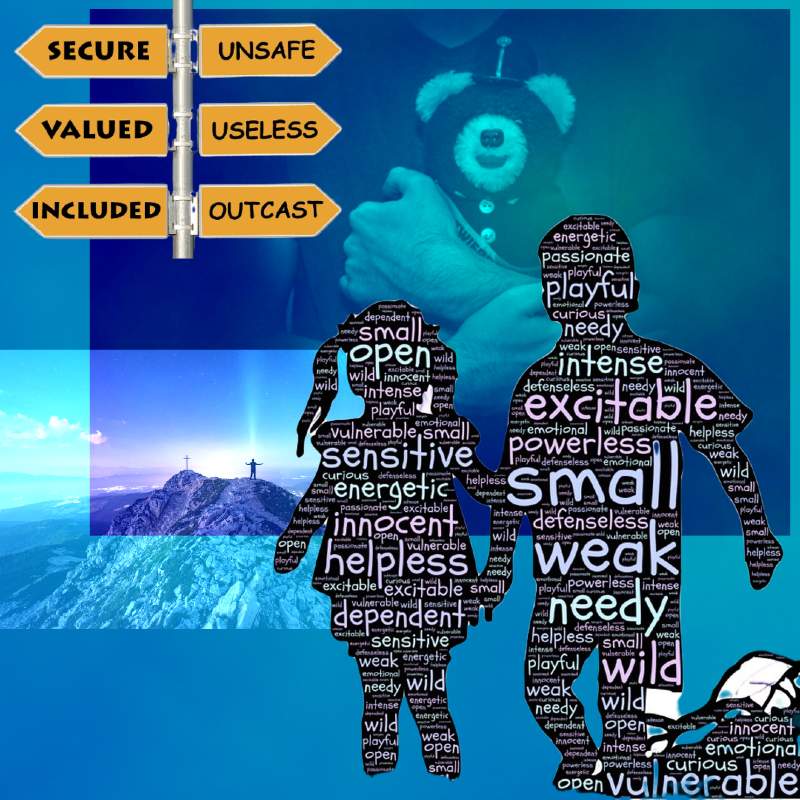
Introduction
Insecurity refers to a lack or absence of self-confidence accompanied by diminished self-esteem. It is often the cause of personal and interpersonal difficulties.
However, it may be disguised and could appear subtly. This article will explore the root and fruit of insecurity. Both root and fruit are declared in singular forms, but each constitutes a cluster.
Root of Insecurity
There is no single cause of insecurity. Any of the following could constitute a root that could make an individual profoundly insecure. The following is the root cluster of insecurity.
1. Frequent parental comparison
When a child is often compared and ends up the loser, the pattern can powerfully result in insecurity about personal abilities.
The peril of comparison stems from the fact that a compared child is often pitted against someone better.
Comparing also shifts the focus of the parents away from the positive strength of the child. This results in an immediate loss of self-confidence.

2. Traumatic events
The trauma here is largely emotional in nature, although it can be translated to physical or mental illness in time.
- Parental separation or divorce. Unfortunately, the child’s thought during this unfortunate event is towards self-blame. The child does not yet have the capacity to delineate that this is completely the parents’ decision and not the child’s fault. “If I were a better boy/girl, my parents wouldn’t have separated,” is the child’s mindset.
- Abandonment for a prolonged period of time. Abandonment can come in many forms: separation by one or both parents, immigration, job promotion which entails family disruption. Prolonged here can be as short as three months. The child thinks, “My father’s welfare/job/plan is more important than me!” It is a direct attack on the child’s selfhood.
- Abuse of any type. A common abuse that results in a perilous attack on the child’s personhood is sexual in nature. The compounding element of sexual abuse is when the child tells a trusted adult, the child’s story is dismissed as malicious. Some adults would even punish the child for telling the story.
Physical abuse is often normalized as socio-cultural in nature, yet it is nonetheless traumatic in nature. “Every child is whipped, so mine is nothing significant!”
Emotional abuse is quite subtle, for it leaves no physical scar. Yet it is potent for it directly results in the child’s doubting of self as one that truly matters. - Neglect. This is often experienced alongside, but not necessarily, abuse. Neglect refers to disregarding the child’s basic needs: clothing, physical nourishment, shelter, appropriate touch, affirmation, understanding, and protection. A pattern of neglect results in the child’s thought that his or her welfare is not important.
Do take note that any of the above items are considered traumatic to the child, for it disrupts the development of inner strength needed to stabilize the self as one who is special and significant.
3. Grief and loss events
The loss of someone special and loved by the child could be categorized as a form of abandonment. But it merits its own explanation as a trigger to trauma for it abruptly cuts the attachment bond between the lost person and the child.
Now the child is left with no one to attach for security. Therefore, it is important for adults neither to dismiss nor spiritualize the child’s sadness as a response to a loss of a cherished object.
It is a sad reality that many of the child’s experiences of grief and loss have not been given adequate attention by concerned adults.
The same unresolved grief and loss experiences have a way of appearing later through common disorders like addiction, depression, and anxiety.

Fruit of Insecurity
Like the root of insecurity, there is no single fruit, for this also constitutes a cluster.
After the fruit cluster is mentioned, you will have an opportunity to recognize that certain behavior you observe could be traced to an insecure origin.
1. Over-neediness
One common result of insecurity is to become overly needy. Recall that the main dynamic of insecurity is a disturbance of attachment.
In other words, the child has not stabilized attachment need for whatever reason mentioned earlier. Therefore, the child grows up with an undeveloped sense of independence.
A direct outcome is to overly attach to someone considered a solid substitute of a missing attachment figure upon whom the insecure individual can depend.
2. Persistent arrogance
Due to inherent doubt in one’s self, the child develops a sense of arrogance: the tendency to become overbearing while exaggerating one’s importance. The insecure individual develops a sense of superiority to hide one’s insecurity.
This person can be obnoxious relationally. In due time, the arrogant person will lose friends who desperately need to cope with life’s challenges. This is when acute loneliness sets in.
3. Pervasive anger
Anger is simply another term for pain that is seething inside the insecure individual who has been emotionally traumatized. When this pain remains unresolved it will directly result in an angry feeling that is pervasive in nature.
A little trigger, something that reminds the insecure of past events, will cause outbursts of temper or expression of intense emotion. Sometimes, the angry person will even be puzzled by the origin of this feeling.
4. Approval seeking
The insecure individual frequently seeks approval from someone who represents stability. Usually, this person is one in authority. A statement of disagreement will be received with such emotional intensity that it will affect the whole week.
Some will even lose sleep over someone’s disagreement. Due to profound insecurity, the individual cannot say “No” to any request for help. Consequently, this results in the next fruit called boundary loss.
5. Boundary loss
A boundary is an invisible line that is set by an individual to behave with integrity and signals who can and who cannot participate in the person’s life process.
Who we do not invite for birthday celebration signals a boundary. Knocking at the door of the teenage daughter’s bedroom before entering shows respect for a boundary.
However, one who struggles with profound insecurity is unable to set limits because doing so might incur disapproval which the insecure desperately abhors.
6. Acquisition lifestyle
Remember that the insecure person’s major challenge is to overcome a sense of lack due to traumatic events in childhood. An easy way to cope with this lack is to observe a lifestyle of acquisition.
This is a simple effort to compensate for the past. The world system that promotes materialism aligns with the need of the insecure.
So, they buy what they do not need to impress those whom they do not like! Their insecurity lingers despite what they have acquired, for things do not really deliver true satisfaction.
7. Constant worry
Unless the root cause of insecurity is addressed, the person lives a life with propensity to worry.
The individual worries about whether there is enough provision for tomorrow; about someone giving disapproval; about the attachment figure leaving; and about personal self-worth.
If this tendency to worry is not properly addressed, the person could develop anxiety disorder that will impair sleep and appetite.

8. Profound perfectionism
Perfectionism is the unrelenting need to be right. So every “t” has to be crossed and every “i” has to be dotted properly.
The perfectionistic individual will edit one’s email at least five times before sending it. The hair has to be curled properly and shoes have to be laced evenly.
Perfectionism can result in procrastination for fear that what will be submitted will be corrected. It is a quick recipe for dissatisfaction.
9. Intimacy problem
There is a common saying which goes, “The best item that a spouse can share is the self!” This calls for openness and honesty.
After all, the preceding two virtues constitute the foundation of a solid marital relationship. But what if the self lacks a sense of confidence? What if the self constantly questions if it truly matters or if it truly is special?
Without a solid sense of self-esteem, the individual will hide and live a life of pretense. The hiding and pretentious pattern can lead to secrecy which destroys developing intimacy.
Conclusion
Insecurity is a common malady that affects many. The fruit cluster mentioned earlier is often observed, yet it is not given enough attention to merit change.
Insecurity has to be addressed at its root. The fruit is simply the symptom. The cause of the problem has to be gently and lovingly dealt with.
If you are reading this blog and struggling with insecurity, as explained above, I wish to encourage you to seek guidance from a trusted, concerned individual.
If you are a concerned individual who has observed someone who struggles with insecurity, you can lead your friend towards awareness by demonstrating how this pattern has affected well-being.
It is important that your relationship with the insecure needs to be solidified so that any expression of concern and any offer of suggestion will be received positively.
If the insecurity has become quite embedded that it has powerfully affected one’s mental health and relationships, the insecure person needs to be encouraged to seek professional counseling.
Important considerations for change include:
- acceptance of the past as past;
- release of offenses of the inflictor of trauma through intentional forgiveness;
- observance of seasons of gratefulness for who one is; and
- becoming a part of a support group that fosters growth towards wellness.
Finally, let us all be reminded that our security does not depend on the attitude and behavior of others toward us.
Our security is grounded upon the truth that we are God’s creation who have been given spiritual gifts to develop and practice so that we can make a positive difference in the lives of others.
From this security comes forth our sense of satisfaction for who we are and for the bright future ahead of us!
May we all encourage those we have opportunities to relate regularly with this truth.
Thank you so much, Dr. Val, for this post. I truly appreciate ‘acceptance of the past as past’ is one of the important key factors for change. This would really help someone start to live up their lives in the present moment and not in the past. This would also mean helping people to be more courageous with themselves and their lives.
Also, thank you for the points of root insecurity, a reminder to be a healthy human being is to focus my eyes on Him :)).
This is quite heart-warming to know that the article resonates with you and those you endeavor to reach out through your skill.
Shalom!